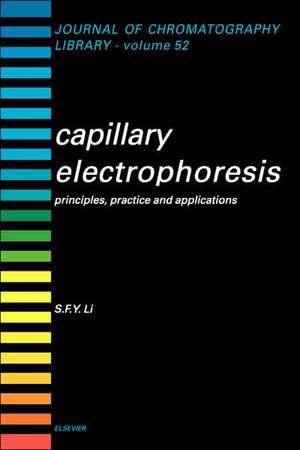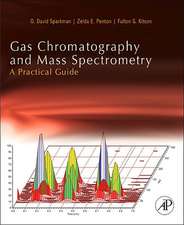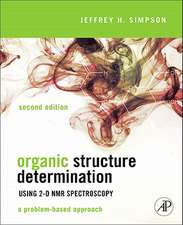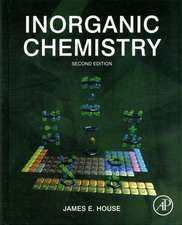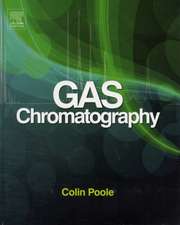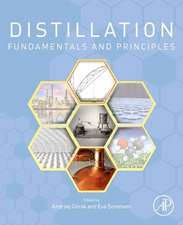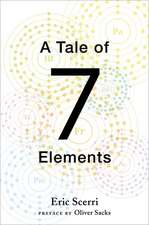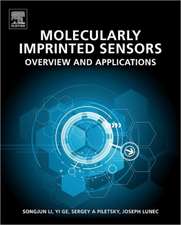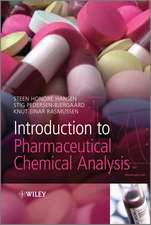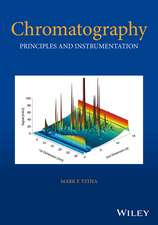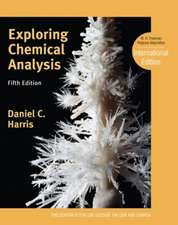Capillary Electrophoresis: Principles, Practice and Applications: Journal of Chromatography Library, cartea 52
Autor S.F.Y. Lien Limba Engleză Paperback – 29 iun 1993
Preț: 1188.08 lei
Preț vechi: 1627.50 lei
-27% Nou
Puncte Express: 1782
Preț estimativ în valută:
227.41€ • 247.10$ • 191.15£
227.41€ • 247.10$ • 191.15£
Carte tipărită la comandă
Livrare economică 21 aprilie-05 mai
Preluare comenzi: 021 569.72.76
Specificații
ISBN-13: 9780444815903
ISBN-10: 0444815902
Pagini: 581
Dimensiuni: 156 x 234 x 31 mm
Greutate: 0.84 kg
Ediția:Revised
Editura: ELSEVIER SCIENCE
Seria Journal of Chromatography Library
ISBN-10: 0444815902
Pagini: 581
Dimensiuni: 156 x 234 x 31 mm
Greutate: 0.84 kg
Ediția:Revised
Editura: ELSEVIER SCIENCE
Seria Journal of Chromatography Library
Cuprins
1. Introduction. Historical Background. Overview of High Performance CE. Principles of Separations. Comparison with Other Separation Techniques. 2. Sample Injection Methods. Introduction. Electrokinetic Injection. Hydrodynamic Injection. Electric Sample Splitter. Split Flow Syringe Injection System. Rotary Type Injector. Freeze Plug Injection. Sampling Device with Feeder. Microinjectors. Optical Gating. 3. Detection Techniques. Introduction. UV-Visible Absorbance Detectors. Photo-diode Array Detectors. Fluorescence Detectors. Laser-based Thermooptical and Refractive Index Detectors. Indirect Detection. Conductivity Detection. Electrochemical Detection. Mass Spectrometric Detection. 4. Column Technology. Uncoated Capillary Columns. Coated Columns. Gel-filled Columns. Packed Columns. Combining Packed and Open-Tubular Column. 5. Electrophoretic Media. Electrophoretic Buffer Systems. Micellar Electrokinetic Capillary Chromatography. Inclusion Pseudophases. Metal-complexing Pseudophases. Other Types of Electrophoretic Media. 6. Special Systems and Methods. Buffer Programming. Fraction Collection. Hyphenated Techniques. Field Effect Electroosmosis. Systematic Optimization of Separation. 7. Applications of Capillary Electrophoresis. Biomolecules. Pharmaceutical and Clinical Analysis. Inorganic Ions. Hydrocarbons. Foods and Drinks. Environmental Pollutants. Carbohydrates. Toxins. Polymers and Particles. Natural Products. Fuel. Metal Chelates. Industrial Waste Water. Explosives. Miscellaneous Applications. 8. Recent Advances and Prospect for Growth. Recent Reviews on CE. Advances in Injection Techniques. Novel Detection Techniques. Advances in Column Technology. Progress in Electrolyte Systems. New Systems and Methods. Additional Applications Based on CE. Future Trends. Subject index.
Recenzii
"...anybody wanting to write a book on CE after this would look like a fool. Everything seems to be there, any detection system you have ever dreamed of, any capillary coating, enough electrolyte systems to saturate your wits, and more, and more.
...by far the most thorough book in the field yet to appear. --Journal of Chromatography
“Anyone reading this book cannot fail to agree with Li's conclusion that the potential of the technique is tremendous. --Analytical Instrument Industry Report
“...a prime source of information both for newcomers and for those versed in the technique. It is strongly recommended. –Endeavour
“...a very useful addition to the literature of separation science encompassing, as it does, all aspects of this rapidly emerging family of methods. It is almost encyclopaedic in its coverage and all chapters are extremely well referenced. This will facilitate any search for original information on any aspect of CE. –Talanta
“All you ever wanted to know about CE can be found in this excellent book. It is a must for beginners and a valuable reference book for the experienced. --Journal of Applied Toxicology
“...a quite useful reference and is highly recommended for libraries and laboratories applying this ever-growing technique, both in industry and academic institutions. --Journal of Liquid Chromatography
“...an invaluable guide to both novice and experienced researchers in the field. --International Journal of Food Science & Technology
“This is a useful book that serves several audiences. The author is to be commended for putting together a thoughtful, complete, and thoroughly useful reference. --Analytical Chemistry
“The author is to congratulated on achieving the objectives for the book. It can be recommended to anyone who wishes to get grips with a techniques that can generate up to thirty million theoretical plates per metre: that should include all separation scientists. --The Analyst
...by far the most thorough book in the field yet to appear. --Journal of Chromatography
“Anyone reading this book cannot fail to agree with Li's conclusion that the potential of the technique is tremendous. --Analytical Instrument Industry Report
“...a prime source of information both for newcomers and for those versed in the technique. It is strongly recommended. –Endeavour
“...a very useful addition to the literature of separation science encompassing, as it does, all aspects of this rapidly emerging family of methods. It is almost encyclopaedic in its coverage and all chapters are extremely well referenced. This will facilitate any search for original information on any aspect of CE. –Talanta
“All you ever wanted to know about CE can be found in this excellent book. It is a must for beginners and a valuable reference book for the experienced. --Journal of Applied Toxicology
“...a quite useful reference and is highly recommended for libraries and laboratories applying this ever-growing technique, both in industry and academic institutions. --Journal of Liquid Chromatography
“...an invaluable guide to both novice and experienced researchers in the field. --International Journal of Food Science & Technology
“This is a useful book that serves several audiences. The author is to be commended for putting together a thoughtful, complete, and thoroughly useful reference. --Analytical Chemistry
“The author is to congratulated on achieving the objectives for the book. It can be recommended to anyone who wishes to get grips with a techniques that can generate up to thirty million theoretical plates per metre: that should include all separation scientists. --The Analyst
